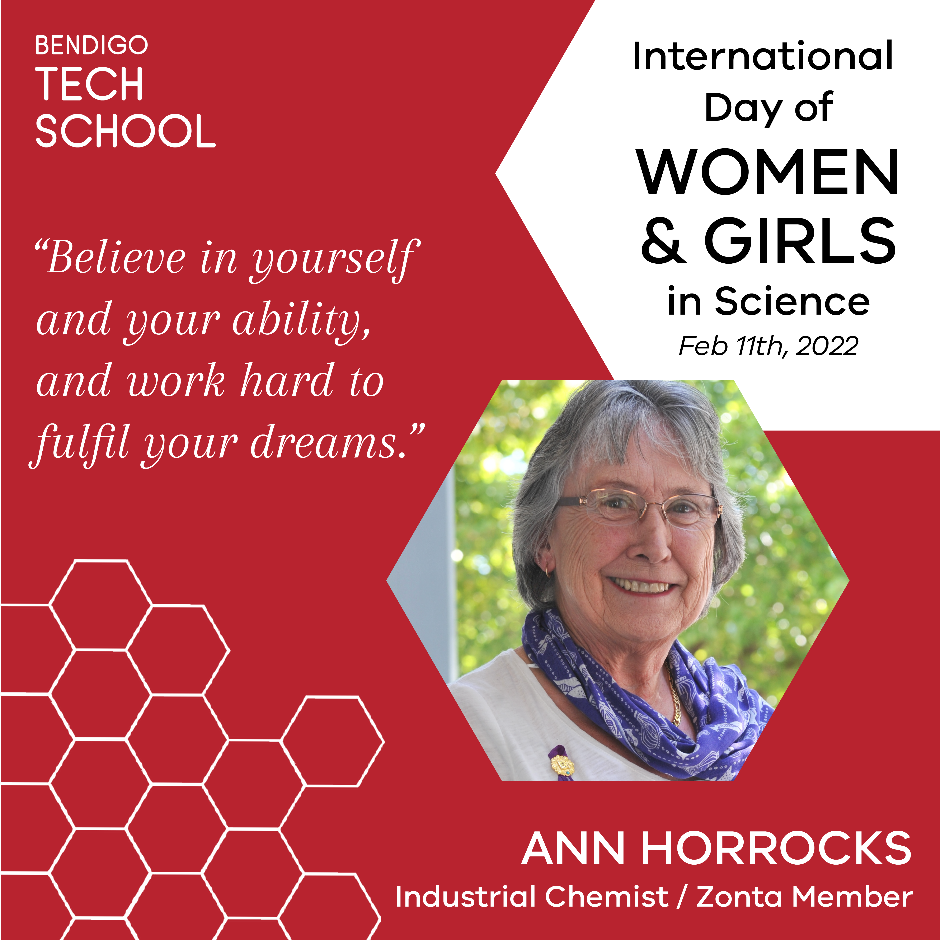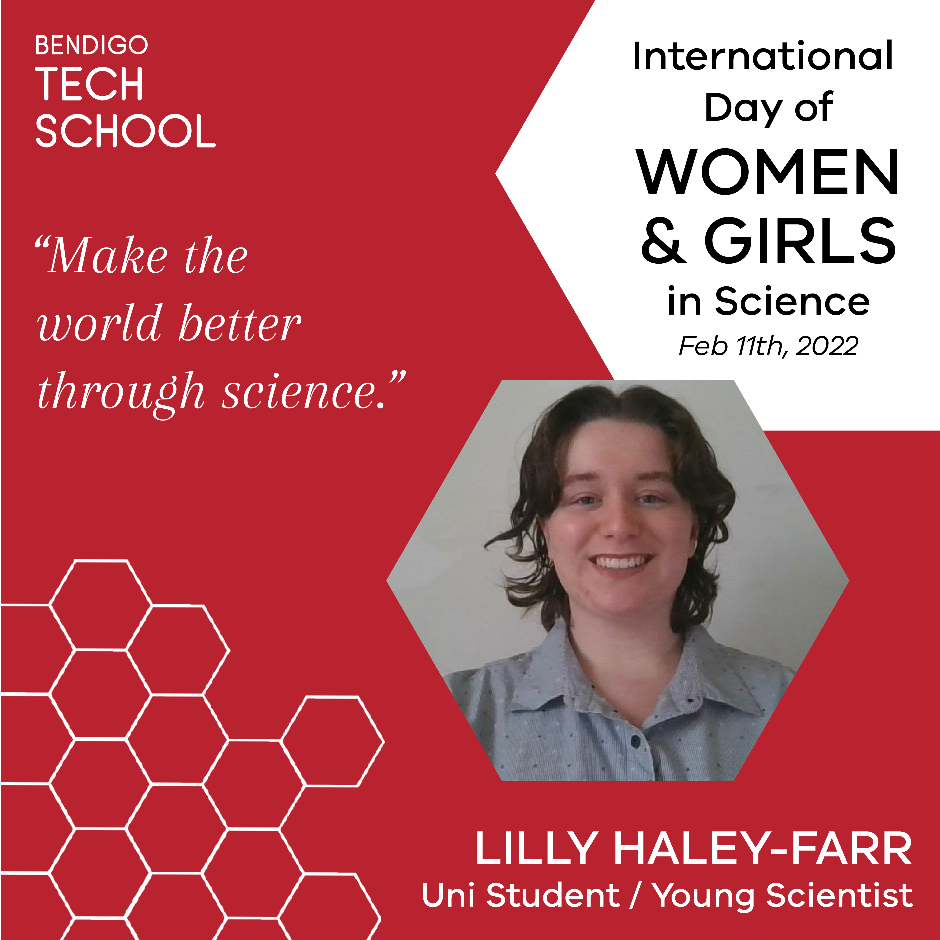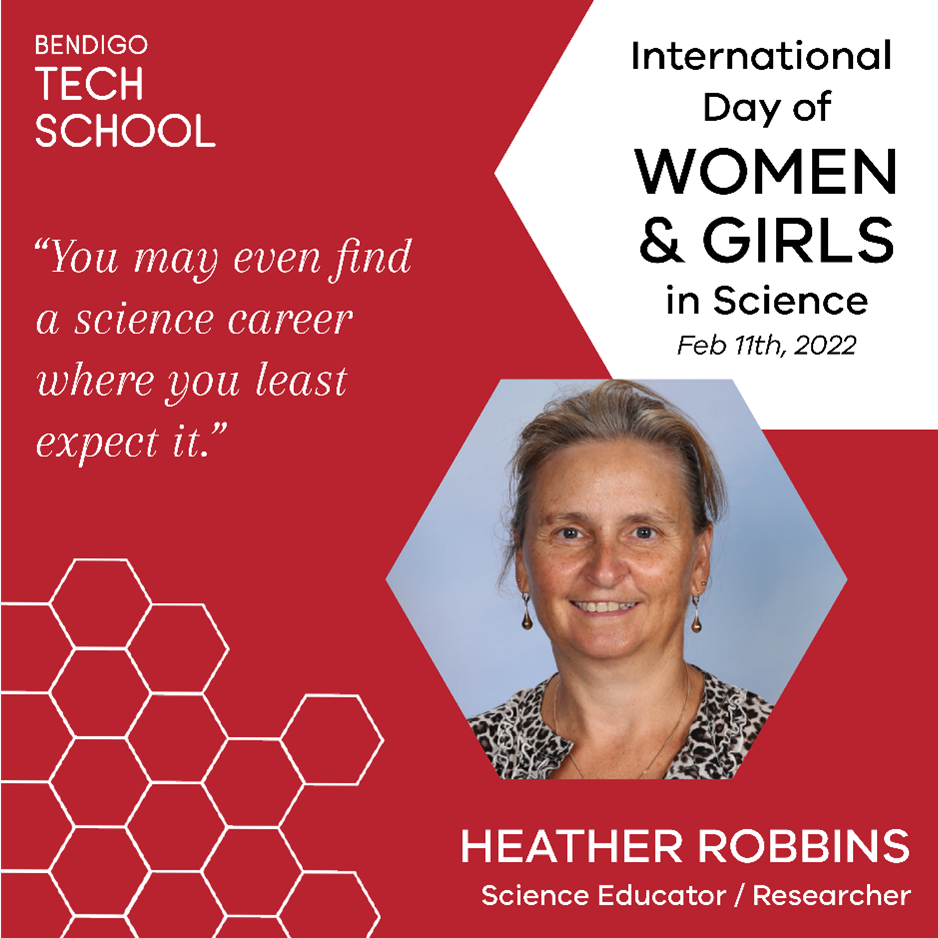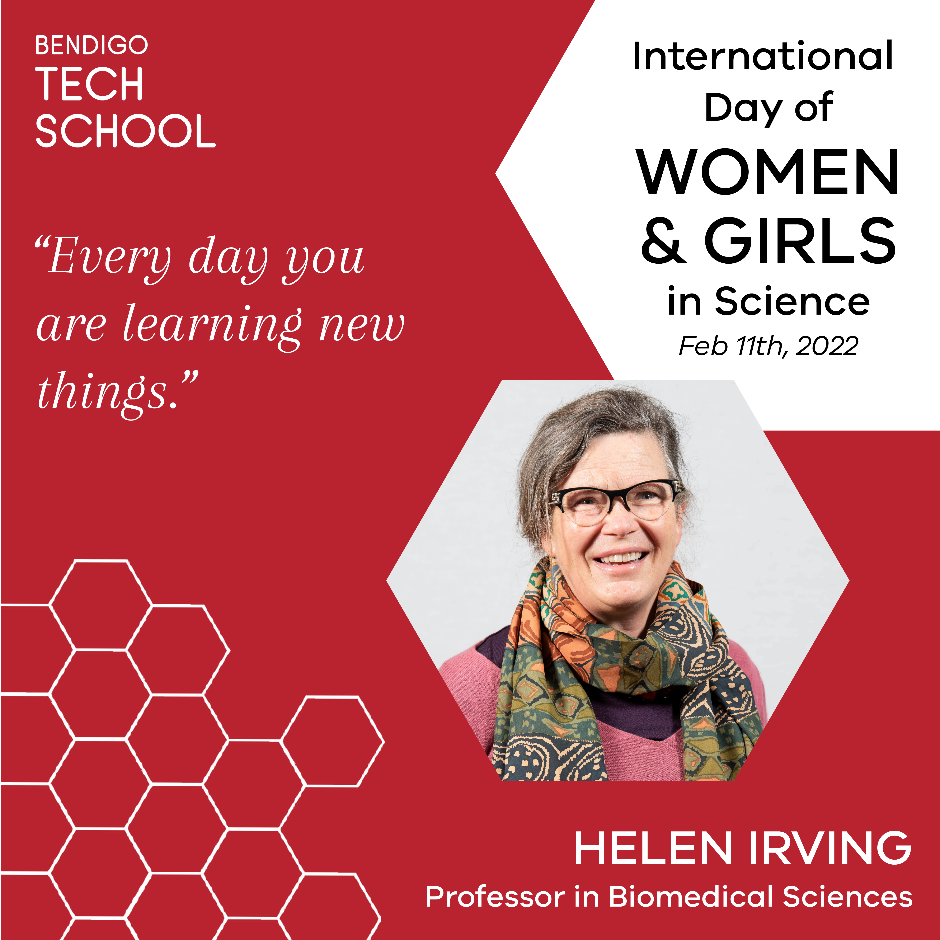

Today (February 11th) is International Day of Women and Girls in Science! The day recognises the critical role women and girls play in science and technology. To celebrate, we're showcasing local women and girls who will do, are doing, and have done incredible things in science.




Ann Horrocks: Retired Industrial Chemist and Zonta Bendigo member.
Who is your biggest inspiration in science?
Marie Curie: Following the discovery of radioactivity Marie Curie and her husband Pierre researched and discovered how to extract two radioactive elements polonium and radium from pitchblende, both more radioactive than uranium. After Pierre’s’ early death, Marie continued her research into these radioactive compounds which became important sources of radiation for both scientific experiments and in the field of medicine, where they are still used today. Marie’s research was totally focussed on better outcomes for all, unfortunately to the detriment to her own health.
Today I am inspired by: Alissa Van Soest, the General Manager at Discovery Science and Technology Centre and Ember Chittenden, Head of Programs at the Bendigo Tech School who are both great advocates for girls in STEM.
What excites you about science?
The research that is being undertaken to reduce the impacts of climate change, in particular by Professor Veena Sahajwalla, the founding director of the Centre for Sustainable Materials Research and Technology at the UNSW. Veena, an inventor and Materials Scientist is renowned for pioneering the high-temperature transformation of waste – turning it into a new generation of green materials and products. She is most well known for her invention of Polymer Injection Technology, or ‘Green Steel’.
Gender equity is now seen as critical to the advancement of science by ensuring all students are empowered, challenged, supported, and provided full access to become successful science learners. Zonta International, of which I am a member, offers many scholarships to girls in primary schools, moving from Year 12 to university and to tertiary and post-doctoral students to assist them in pursuing STEM careers. Further information is at: www.zontabendigo.org and www.zonta.org
What has been your biggest achievement in science?
Completing my Applied Chemistry studies back in the 1960s while working in Food Research and establishing a food testing laboratory in Tasmania. After a 20-year gap being able to take up science again but now in the field of metallurgy and metal finishing. As this was a steep learning curve, having to believe in myself and being ready to ask for and accept guidance. I also enjoyed the extra study involved to be proficient in OH&S testing. During these years, I obtained NATA Registration for the Chemical Laboratory and became a NATA Laboratory Assessor throughout the Eastern States of Australia.
What is your advice for young girls looking at embarking on a career in science?
Believe in yourself and your ability and work hard to fulfil your dreams. Seek a mentor if you can. Remember that you will be guided and taught by professionals who are passionate about STEM, so do not hesitate to ask for support along the way. By studying STEM subjects, you broaden your knowledge and clear-thinking skills preparing you to take up many different roles in industry or research. To always investigate if there are STEM scholarships available as you pursue your studies.
Lilly Haley-Farr: University Student and Young Scientist.
Who is your biggest inspiration in science?
My biggest inspiration in science is Emmy Noether. Though primarily a mathematician in the late 1800's an early-to-mid 1900's, she developed what is known as Noether's Theorem which connects mathematical symmetries and physical conservations of momentum. It is one of her most influential achievements and has been significant in the progression of the field of physics, especially to that of general relativity.
I find her understanding of complex topics and her dedication to the acquirement of knowledge inspirational but more notably, her resilience through struggle as one of the first women to receive higher education and her continuation of teaching in the US following her expulsion from university teaching in Germany during the Nazi regime.
What excites you about science?
I find science incredibly exciting as it has the ability to continuously develop at a more rapid pace to most fields of study and so offers the chance to perpetually learn and challenge yourself within the field.
What has been your biggest achievement in science?
My biggest achievement in science has been my role in the 2019 'Pollinator' student team in the THALES + Tech School Design Competition where we developed prototypes of a portable air-particle detector and alert system which linked robotics and relied on our understanding of human and plant biology and their connections.
What advice would you give your future self about your science journey?
Always remember the curiosity and wonderment I've always had for the world and science, and my desire to make the world better through science.
Heather Robbins: Science Educator, Catherine McAuley College, and Researcher.
When I was in primary school, I always wanted to be a vet. I loved animals and I wanted to help them when they were sick. When I went to high school, it was so exciting that we had the opportunity to study science. That was the start of my journey to becoming a vet. It was great, I had some fantastic science teachers, and I quickly became to wonder, ‘Why doesn’t everyone want to know the way things work? Why they work? How they work? What happens when they don’t work anymore? How can I fix it?’
Moving through the years at high school, I discovered that getting the grades to become a vet took more application and understanding than I was able to muster. So, at the end of Year 12 I was accepted to do a Bachelor of Science degree at the University of Melbourne, majoring in Zoology and Genetics.
After finishing my degree, I was fortunate enough to get a job in a research laboratory in the Department of Anatomy and Physiology at the University of Melbourne. I was working as part of a research team looking at the nervous system around the gastrointestinal tract.
Who is your biggest inspiration in science?
After thinking extensively about the answer to this question, pondering great scientists, I couldn’t go past my first boss, the Professor of our research team, Professor John Furness. He had such an enthusiasm for research, a passion for the enteric nervous system, he embraced new technologies, he maintained connections with research scientists around the world. John always asked the questions that had gone through my head as a teenager at high school. Finally, he had that incredible attention to detail that enables scientists around the world to collaborate reliably, to engage different approaches to solve the same problem, to fit the pieces of the puzzle together.
What excites you about science?
I love the scientific process. Make an observation, ask the question why, work out how to answer the question, do the experiments, analyse the results, and try and come up with an explanation using the evidence. I could never understand why someone wouldn’t want to try and understand how something works, why is it that way? Especially the animal body.
What has been your biggest achievement in science?
Working in a research laboratory for 16 years I managed to answer quite a lot of questions, resulting in scientific journal publications. However, I feel my greatest achievements in science to date, have occurred through my role as a STEAM teacher. When you teach a young person and see their passion grow for a subject close to your heart, it’s amazing.
What is your advice for young girls looking at embarking on a career in science?
Science is accessible to everyone regardless of age, gender, cultural background, or ability. If you like science, aim high and if you don’t quite achieve your expectations, there is always a pathway to a science that may interest you. You may even find a science career where you least expect it.
Helen Irving: Professor in Biomedical Sciences and Head of Department, Pharmacy and Biomedical Science, La Trobe University.
Who is your biggest inspiration in science?
I am not sure that I have one biggest inspiration in science. There are many inspirational scientists that I admire, and I have worked with some fantastic science mentors. Some amazing women scientists include Marie Curie, Barbara McClintock, Elizabeth Blackburn.
What excites you about science?
Finding something new - the light bulb moment! Every day you are learning new things, but it is particularly exciting when your experiments reveal new discoveries...
What has been your biggest achievement in science?
Working in teams to elucidate how environmental signals are relayed within cells to enable different responses such as producing new proteins. This area of signal transduction has intrigued me for a long while. It has been amazing to be part of the international team of scientists working to understand the molecular mechanisms.
What is your advice for young girls looking at embarking on a career in science?
To follow their passions in science. Sometimes these will take you to unexpected science questions and often to new physical places to work with great teams. These are incredibly rewarding experiences.
